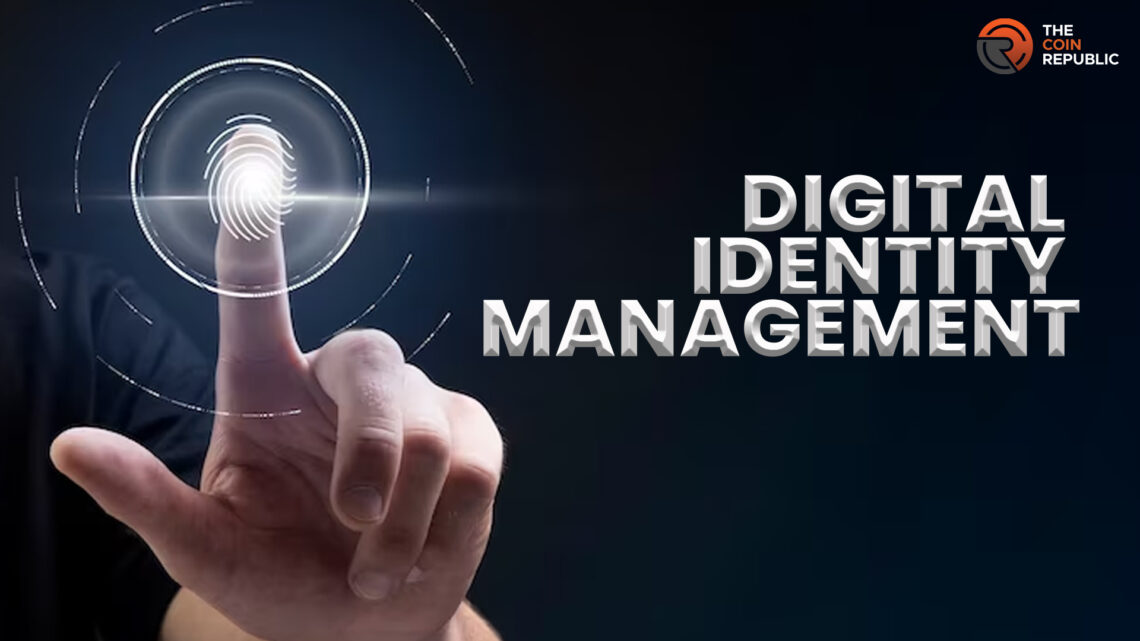- 1 Digital identity is basically the data that helps in recognizing and authenticating a person carrying out a digital activity and accessing resources.
- 2 The digital ID management versus control debate arises from challenges like privacy, security, centralization of power, data manipulation, and authoritative control.
- 3 Effective solutions for digital identification to win user trust and ensure security in every aspect include access control, data limitation, KYC, and many more.
Digital identity plays a very important role in not only businesses and data handling but also in the wake of crypto and other digital currency-based finance. The debate gained momentum again with the recent launch of the controversial cryptocurrency WorldCoin, which itself is founded on the principles of establishing unique digital identities.
As digitization of every offline thing, activity, and medium inflates, the importance of authentic identities increases. With blockchain gaining wider adoption and almost every industry shifting to a distributed ledger database, the footfall of online consumers gets more and more complex.
And then there is a boom of finance, crypto or otherwise, leveraging the DLT, which makes establishing unique, authentic, and attack-proof digital identities mandatory rather than important. The situation is aggravated by the advent of AI, which is increasingly being used, with malicious intent or otherwise, by individuals to partake in this data-sensitive traffic.
On the other side, there are concerns, and fairly so, regarding governments and political regimes trying to impose intense state-sanctioned control over the citizens. They want to be able to track every movement, financial transaction, and decisive act of the common man. This will ultimately lead to the state seating itself at the pinnacle of power and seizing the individual’s autonomy.
Digital Identity Management in Crypto
Cryptocurrencies launched with one of the underlying objectives being the anonymity and privacy of transactions. In a decentralized setting, authentic digital identity management becomes very important. Consumer trust is built on a robust identification mechanism that ensures the security of their funds and the safety of their investment. Besides, it is very crucial for the execution of smart contracts, as it requires the confirmation of the transaction using end-to-end recognition.
Digital ID management is closely attached to the idea of decentralization. It secures the tokenization of real-world assets and helps make sense when it comes to the ownership of digital assets. It gives people increased privacy, authority, and control over their own identities.
Digital Identity Management for Businesses
It can never be said enough that the digitization the world is facing right now is integrating almost every aspect of human life online. It includes everything, right from fitness trackers to retail services like Amazon and Walmart, medical documents like insurance, blood reports, doctor’s appointments, finance systems like ATMs and online transactions, banking, telephone services, accessing the internet, media, entertainment, social media, and a lot more.
Everything people access requires them to create an account and share certain personal details. These will be attached to them whenever they access those services and products, to authenticate and recognize them among the volumes of users. All of this means loads of personal data are shared online, giving exposure to vulnerabilities in data privacy and security.
Hence, it necessitates a comprehensive digital identity management system for these businesses, especially those trading in the commercial space for the general public. All users must be protected against unauthorized data access, phishing, and identity theft.
On the organization’s level, all employees must be assigned a digital identity to access company resources and data, be it on-premises or remotely, such as through cloud or third-party services. Firewalls and malware protection are convenient options.
Unique Universal Digital Identity in the Age of AI
AI is getting more and more mainstream adoption. It automates cumbersome and low-skill requiring operations and helps avoid repetitive tasks so that humans can focus their energy on more intellect–requiring tasks. However, the problem is that it also creates a system of wealth distribution that prevents general access and increases centralized concentration.
This means a negative impact on the overall economy as wealth gets concentrated among the very few while markets dry up. However, it is less likely that the adoption of AI is going to slow down. A solution proposed to the problem is Universal Basic Income (UBI).
The twist is that there are going to be newer problems of identity theft and fraud, as it means more and more data going online in the public sphere. This is true specifically because the distribution and allocation systems will be totally digital, meaning more digital ownership than physical.
Frauds due to AI, such as bots pretending to be humans, carrying out frauds, manipulating data by displaying false footfall, making misleading claims, etc., are becoming more prominent. With UBI, such activities will be commonplace, and the consequences will be much worse.
Hence, we desperately need a universal digital identity unique to every person on every online platform. In the absence of such a system, all of these online arrangements, like UBI, AI verification, validation of transaction activity, authentication, the accuracy of fund allocation, etc., become obfuscating, easy to manipulate, and defraud.
Problems with Digital Identity Control
The recent controversy was sparked by the launch of Worldcoin, which proposed establishing digital identities using cryptocurrency. Concerns arose due to the underlying mechanism of collecting biometric data using Iris scanning with their orb. A lot of experts suggest that the highly sensitive data could be misused by governments and oppressive regimes.
Worldcoin and other such organizations could be pressurized to provide data to the government. Open-sourcing the hardware could also enable totalitarian regimes to seize control over such technology and use it against their citizens.
5 Effective Solutions for Digital Identity Management
Self-Sovereign Identities (SSI): Self-Sovereign Identities is a robust solution used especially in decentralized systems. It eliminates the need for identity provision via a third-party app. Users get full control of their identities and decide to provide only the data they want to share. They also generate cryptographic pass keys that are restrictive for the specific platform, helping to prevent the sharing of actual information. Because of the users’ own control over their keys, these verifiers are called decentralized identifiers.
Know Your Customer (KYC), Anti-Money Laundering (AML), Biometric: After careful consideration of various schemes of KYC, these can be effectively adopted to build the users’ trust. AML practices compliance with the regulations to prevent further problems that could arise in the future and maintain positive government control. Biometric data, as sensitive as it is, is also a highly secure form of verification, allowing for a sort of proof of personhood (PoP). The key is to use it with ethics and permission from the individual.
Data Encryption and Hashing: Data can also be encrypted to allow only selected access for those who have valid access. It’s important to note that when data is in transit from one server to another, it is usually at its most vulnerable. That’s why encryption in transit is crucial to data protection.
Proof-of-Personhood: This provision for blockchain-based databases is widely being talked about within industry circles. AI often obfuscates identities and leads to data manipulation, rendering individuals and organizations huge losses. Biometrics is a solution that promotes other procedures, including careful data sifting, to accurately monitor an entity’s online activity.
Limited Access: Collect only what’s needed instead of carrying out unnecessary compliance information gathering. Not all data is continuously in use among the entities that were granted previous access. Hence, role-based provisioning and de-provisioning must be ensured within the organizations so that access doesn’t become centralized.
Conclusion
With the digital space increasingly absorbing our reality, an identity layer for the web and its recent advancements, such as Web3, would be an identity layer that becomes vital for our lives. In the wake of cryptocurrency and blockchain governing our data, the management of identities will drive sensibility into these systems.

With a background in journalism, Ritika Sharma has worked with many reputed media firms focusing on general news such as politics and crime. She joined The Coin Republic as a reporter for crypto, and found a great passion for cryptocurrency, Web3, NFTs and other digital assets. She spends a lot of time researching and delving deeper into these concepts around the clock, and is a strong advocate for women in STEM.


 Home
Home News
News









